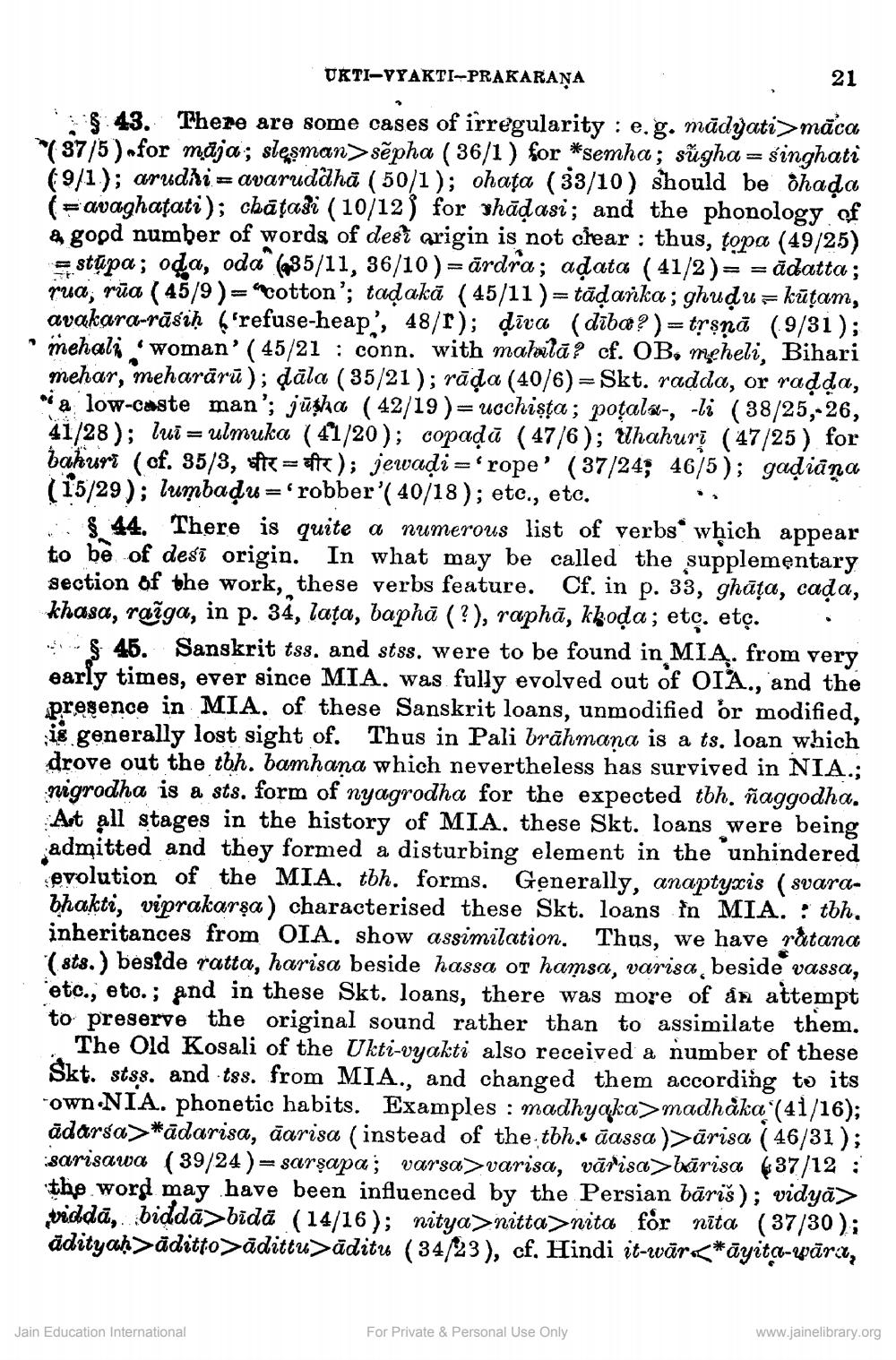________________
UKTI-VYAKTI-PRAKARAŅA
21
S 43. There are some cases of irregularity : e.g. mādyati>măca (3715 ) afor maja; slesman>sépha ( 36/1 ) for *semha; săgha = singhati (9/1); arudhi = avarudāhā (50/1); chata (33/10) should be dhada (=avaghatati); chātasi (10/12) for shādasi; and the phonology of a good number of words of desi arigin is not chear : thus, topa (49/25) = stūpa; oda, oda (935/11, 36/10 )=ārdra; adata ( 41/2)= = ādatta; rua, rūa (45/9)="cotton'; tadakā ( 45/11 )= tādanka; ghudu = kūtam, avakara-rāsih b'refuse-heap', 48/1); diva (dība ? ) = trọnā (9/31 ); mehala woman' ( 45/21 : conn. with mahalā? cf. OB meheli, Bihari mehar, meharārā); dāla ( 35/21 ); rāda (40/6)=Skt. radda, or radda, *a low-caste man'; jūsha (42/19 )= ucchista; potala-, li (38/25, 26, 41/28); lui= ulmuka ( 41/20); copaļā ( 47/6); dhahuri (47/25) for bahuri (cf. 35/3, sfts = efte); jewadi =érope' (37/24; 46/5); gadiāna (15/29); lumbadu = robber'( 40/18); etc., etc.
$44. There is quite a numerous list of verbs which appear to be of desī origin. In what may be called the supplementary section of the work, these verbs feature. Cf, in p. 33, ghāta, cada, khasa, ražga, in p. 34, lata, baphā (?), raphā, kkoda; etc. etc. .
§ 45. Sanskrit tss, and stss. were to be found in MIĄ. from very early times, ever since MIA. was fully evolved out of OIA., and the presence in MIA. of these Sanskrit loans, unmodified or modified. iġ generally lost sight of. Thus in Pali brāhmana is a ts. loan which drove out the tbh. bamhana which nevertheless has survived in NIA.; Nigrodha is a sts. form of nyagrodha for the expected tbh. ñaggodha. At all stages in the history of MIA. these Skt. loans were being admitted and they formed a disturbing element in the unhindered evolution of the MIA. tbh. forms. Generally, anaptysis ( svarabhakti, viprakarsa) characterised these Skt. loans in MIA. : tbh. inheritances from OIA, show assimilation. Thus, we have råtana (sts.) bestde ratta, harisa beside hassa or hamsa, varisa, beside vassa, etc., eto.; and in these Skt. loans, there was more of an attempt to preserve the original sound rather than to assimilate them.
The Old Kosali of the Ukti-vyakti also received a number of these Skt. stss. and tss. from MIA., and changed them according to its own.NIA. phonetic habits. Examples : madhyaka>madhåka (41/16); ādarsa> *ādarisa, āarisa (instead of the tbh. Kassa)>ārisa ( 46/31); sarisawa (39/24)= sarsapa; varsa>varisa, vārisa>bīrisa 37/12 : the word may have been influenced by the Persian bāriš); vidyā> viddā, biddā>bida (14/16); nityanitta>nita fornita (37/30); adityan>āditto>ādittu>āditu (34/23), cf. Hindi it-wār«<*āyita-vāra,
Jain Education International
For Private & Personal Use Only
www.jainelibrary.org




